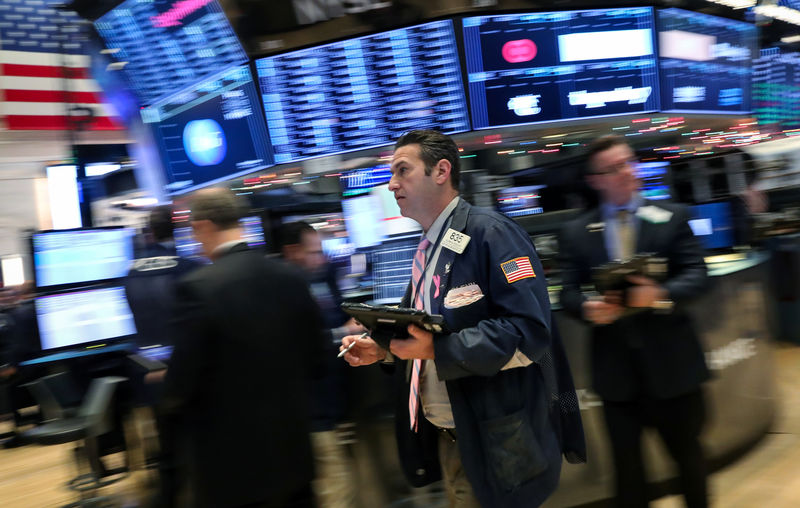By Sinéad Carew
(Reuters) - U.S. stocks were up 1 percent on Wednesday afternoon, though well below their session highs, as investors were hopeful about U.S.-China trade relations after the latest comments from both sides and eyed some reassuring signs in British politics.
U.S. President Donald Trump, in an interview with Reuters, said trade talks were under way with China. Traders said China made the first major purchase of U.S. soybeans since Washington and Beijing agreed to a temporary trade truce earlier this month.
Also, Trump said he would intervene in a case against a top executive at Huawei Technologies if it would help secure a trade deal.
The China news helped Wall Street, along with expectations Britain's Prime Minister might keep her job for now.
The S&P pared gains as the day wore on as investors were cautious about the rally's sustainability. But they found some technical reassurance as stocks have recently bounced back multiple times intraday after testing 2018 lows.
"We've had numerous retests of those lows. Each retest makes the support stronger," said Robert Phipps, director at Per Sterling in Austin, Texas. "We know where the likely floor is. There's some comfort in the market based on that belief."
But Phipps cautioned that while the market might stay above the 2018 lows it would likely continue to be volatile at least until a U.S.-China negotiating deadline at the end of February.
"Not only is Trump unlikely to seal a deal until the end of February but the rhetoric gets more abrasive the closer he gets to the deadline," he said. "There's a lot of political issues that are going to keep pressure on the market from now to the end of February."
At 3:13 p.m. ET, the Dow Jones Industrial Average (DJI) rose 305.22 points, or 1.25 percent, to 24,675.46, the S&P 500 (SPX) gained 31.8 points, or 1.21 percent, to 2,668.58 and the Nasdaq Composite (IXIC) added 114.04 points, or 1.62 percent, to 7,145.87.
Of the S&P's 11 major sectors 9 were in positive territory with 8 showing gains of around 1 percent or more. The real estate sector <.SPLRCR> was the biggest loser with a 1.4 percent drop while utilities (SPLRCU) followed with a 0.4 percent decline, showing a lack of appetite for defensive sectors.
The S&P technology sector (SPLRCT) gained 1.6 percent, providing the biggest support to the benchmark. The sector is heavily exposed to China trade.
Trading has been especially choppy in the past few days amid a slew of headlines on topics ranging from China trade and a potential U.S. government shutdown to uncertainty around Britain's divorce from the European Union.
After British Prime Minister Theresa May struggled to reach an exit deal this weak investors contemplated the possibility of a disorderly "no-deal" departure or another referendum.
May promised on Wednesday to step down before the next parliamentary election due in 2022, hoping to win over wavering lawmakers before a no-confidence vote triggered by Brexit supporters.
China-based music streaming company Tencent Music Entertainment (N:TME) was last up 7.9 percent in its U.S. debut.
Advancing issues outnumbered declining ones on the NYSE by a 2.69-to-1 ratio; on Nasdaq, a 2.48-to-1 ratio favored advancers.

The S&P 500 posted 14 new 52-week highs and 6 new lows; the Nasdaq Composite recorded 21 new highs and 141 new lows.